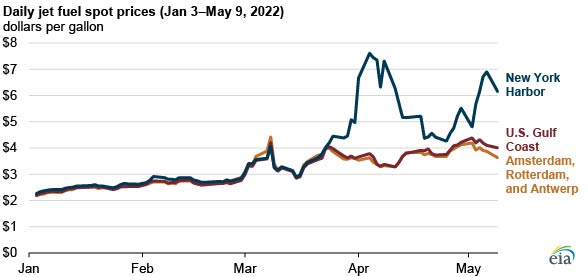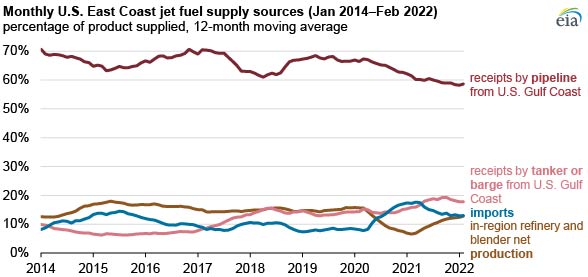
The spot jet fuel price in New York Harbor traded at record-high levels for several weeks in April. The price has since declined, but it has remained higher than the prices at both the U.S. Gulf Coast and the Amsterdam, Rotterdam, and Antwerp (ARA) trading hubs. The high jet fuel prices coincide with record-low jet fuel inventory levels on the East Coast and rising demand for air travel. A confluence of supply and demand factors has contributed to increased price volatility in the East Coast jet fuel market.
Reduced consumption of most petroleum products after the beginning of the COVID-19 pandemic in 2020 affected refinery operations; these changes focused on maximizing yields of distillate fuel oil, whose consumption decreased comparatively less than gasoline and jet fuel during the pandemic. As refineries shifted yields to produce more distillate fuel oil, jet fuel production from refiners in both the U.S. Gulf Coast and East Coast regions has remained relatively low.
East Coast jet fuel inventories declined to 6.5 million barrels the week ending April 8, 2022, the lowest for any week since 1990, when we began reporting weekly jet fuel inventories by region. This decline began in the middle of 2021 as jet fuel demand increased. Increasing consumption and relatively low refinery and blender production of jet fuel have contributed to low inventories on the East Coast since late 2021.

Although most of the East Coast’s jet fuel supply is shipped by pipeline from refineries in the U.S. Gulf Coast region, the East Coast has also increased its jet fuel imports as well as shipments by tanker and barge from the U.S. Gulf Coast in the past two years. Imports and tanker and barge shipments are more expensive methods of delivery than pipeline shipments, suggesting that East Coast purchasers are using shorter-term spot transactions for supply.
Beyond the pandemic-related disruptions to petroleum product supply and demand, the East Coast’s loss of the 335,000 barrels per day (b/d) Philadelphia Energy Solutions refinery, which closed after an explosion in mid-2019, has affected refinery output of all petroleum products in the region, including jet fuel. Based on average East Coast jet fuel yields and refinery utilization, we estimate the refinery produced 20,000 b/d of jet fuel, a volume equivalent to about 20% of total East Coast jet fuel production before the COVID-19 pandemic.


Follow us on social media: